STRENGTHENING NATIONALITY INSIGHT WITH GEO-LITERACY
Abstract
The nationality insight should be owned by all Indonesian citizens. This insight is identical with civics knowledge. Besides, not only by studying civics knowledge anyone can improve their nationality insight, but also from other knowledge, such as by learning geography science. Understanding the environment is one of the scopes in geography science. Understanding the environment can possibbly to increase the nationality insight. This research aims to applying geo-literacy as a study method, so the student can improve their ability to understand the earth. The subject of this research is the 4th semester student of Geography Education Department, Faculty of Social Science Universitas Negeri Manado. Analyzing data is based on the calculation of the percentage of results of filling out questionnaires by respondents. The questionnaires formed by the author from literature study from the syntax of geo-literacy method (from the National Geographic Magazine) combine with the indicator of nationalism in the document of nationality by Lembaga Administrasi Negara Republik Indonesia. By applying geo-literacy as a study method in geography education, the majority of students strongly agree that geo-literacy has the ability to strenghtening student’s knowledge to know the world (by applying geographical approach) and make the best decision for the environment.
Keywords
Full Text:
PDFReferences
Edelson, D. C. (2014). Geo-Literacy: Preparation for Far-Reaching Decisions. Galani, L. (2016). Geo-literacy as the basis of the building of cultural identity. European Journal of Geography. Joshi, A., Kale, S., Chandel, S., & Pal, D. (2015). Likert Scale: Explored and Explained. British Journal of Applied Science & Technology, 7(4), 396–403. https://doi.org/10.9734/bjast/2015/14975 Latief, Y., Suryanto, A., & Musli, A. A. (2015). Modul Pendidikan dan Pelatihan Prajabatan Golongan III “Nasionalisme.” Lembaga Administrasi Negara, iii+152. Retrieved from http://www.ghbook.ir/index.php?name=فرهنگ و رسانه های نوین&option=com_dbook&task=readonline&book_id=13650&page=73&chkhashk=ED9C9491B4&Itemid=218&lang=fa&tmpl=component Nazari, M., & Webber, S. (2011). What do the conceptions of geo/spatial information tell us about information literacy? Journal of Documentation, 67(2), 334–354. https://doi.org/10.1108/00220411111109502 Ruhimat, M. (2017). Peningkatan Pemahaman Wawasan Kebangsaan Melalui Literasi Geografis. Prosiding Seminar Nasional Tahunan Fakultas Ilmu Sosial Universitas Negeri Medan. Stewart, I. S., & Nield, T. (2013). Earth stories: Context and narrative in the communication of popular geoscience. Proceedings of the Geologists’ Association. https://doi.org/10.1016/j.pgeola.2012.08.008 Urfan, F., Darsiharjo, D., & Sugandi, D. (2018). Geo-Literacy between School Environment and Students Spatial Intelligence. IOP Conference Series: Earth and Environmental Science, 145, 012044. https://doi.org/10.1088/1755-1315/145/1/012044y
Refbacks
- There are currently no refbacks.












.png)

